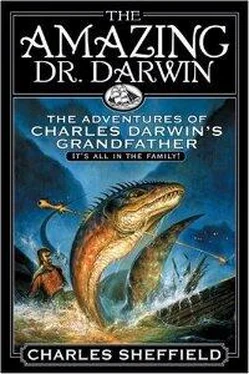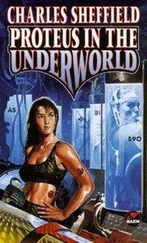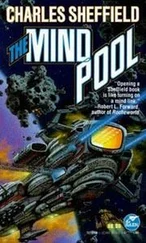They had reached the hall, a rectangular building of grey limestone fifty yards from the river. The double entrance doors were iron-bound oak, open now but carrying two heavy padlocks. On the left-hand door was pinned an announcement that the Heart of Ahura Mazda would be on display from January 30th to April 25th. The right-hand door showed the admission price, of twopence per person per visit.
Within, half a dozen oil lamps lit an oblong sanded floor, in the center of which stood a large metal plate. Upon the plate was a silver pedestal, and on top of that an empty cushion of black velvet within a hemisphere of glass.
The messenger and Murchison hurried on at once toward the far wall, where a motionless human form lay surrounded by a small group of men. But Darwin stood just two steps inside the door, wrinkling his nose in perplexity and sniffing the air. It was ten more seconds before he walked forward, moving to study the pedestal and its empty cover. Finally he banged his walking stick hard on the stone floor, to produce a hollow boom that echoed around the hall. He walked forward to join the others.
The body lay supine, blue eyes open and arms thrown wide. Darwin knelt down beside it, and grunted in astonishment. The man was the black-haired stranger from the Boar’s Head Tavern.
“And who are you, sir?” asked one of the men standing by the body. He was well dressed in a heavy woollen coat, leather boots, and gaiters, and he wore clerical garb. “The magistrate has already been called.”
“I am Erasmus Darwin, a physician.” Darwin did not look up. “But I fear I can do nothing for this poor fellow. Does anyone here know him?”
“I do, sir.” It was a watchman, carrying a staff and a shielded lantern. “He’s been regular in these parts these two year, an’ often ’anging around when jewlery an’ plate goes a-missin’. But nuffin’s been proved, not near enuff for a dance at Tyburn.”
“You sent for me when you found him?”
“No, sir. Not I.”
“Then which of you did send for me?”
There was a silence. Darwin turned to the messenger, who shook his greasy head firmly. “None of these gentlemen, sir. I was given a florin in Lower Thames Street, by a man I never seed before. He said there was somebody a-dying in the Exhibition Hall, and I was to go to the Boar’s Head an’ bring Dr. Erasmus Darwin.”
“I saw this man alive, in that same tavern, less than an hour ago.” Darwin bent to grasp the man’s wrist, and to touch him on temple, mouth, and at the hollow of his neck. He loosened the fustian jacket, and made a rapid examination of chest and abdomen. Then he stood up. “He has been dead less than thirty minutes. Who found him?”
“Me it was.” The grubby watchman lifted his staff. “On me first round. I sees a window open at the back, so I come to the front an’ let meself in.” He held up a heavy bunch of keys. “With these. An’ there he was. Dead as mutton. An’ the jewel—gone.”
“He is just where you found him?”
“Yessir. I think he staggers back here, see, tryin’ to reach the winder, but ’e dies ’fore he gets to it.”
Darwin shook his head and pointed to the sanded floor. In the lantern light, a pair of wavy lines ran from the metal plate and pedestal to the wet, battered shoes of the dead man. “He was dragged this way. You are sure that no one here pulled him?”
“Positive, sir.” The clergyman spoke again. “I was passing by, and I came in straight on the watchman’s heels. When we entered the man was exactly as you see him.”
“Just as the demon left him,” said a ragged man softly. The little group of people stirred and looked nervously around the shadowed hall.
“Now then, we’ll have no blasphemies here,” said the clergyman mildly. “When a man dies, there is no need to call for demons. I’m sure the doctor can tell us the natural cause of death.”
The men around the body turned to Darwin expectantly. He hunched his shoulders, and shook his head in irritation. “The obvious diagnosis is a massive heart failure, but it is not a reply I can offer in good conscience. I saw this man earlier today, and observed him closely. He was not at the point of death. And I am sure that this was not present.”
Darwin stooped, and lifted the limp right arm of the dead man. As he turned it, an ugly heart-shaped cicatrix about an inch and a half across was revealed on the palm of the hand. The middle was white, the edge a lurid blood-red.
“The Mark of the Beast!” Everyone except Darwin and Murchison took a pace back.
“Nonsense.” The clergyman’s voice sounded less confident than his words. “It is a simple wound—a burn. Is that not so, sir?”
“It is not.” Darwin gestured at Murchison, who had sunk to his knees to study the mark more closely. “No medical student would admit such a conclusion were I to draw it. But as to what it is…” He fell silent, then looked up. “I would like a chance to examine the body more fully. I have seen nothing like this in twenty years as a physician.”
He straightened, and walked across to the pedestal. He lifted it, in spite of Jamie Murchison’s cry, “Be careful!”
“Careful of what?” Darwin peered at the empty setting of black velvet, then at the silvered sides of the pedestal. “If there is no demon who guards the Heart of Ahura Mazda, then surely I am in no danger. And if there is a demon who accompanies the ruby, since the ruby is not here, again I am safe.”
“So you truly believe that we have a—a—” The clergyman had followed Darwin, but he could not bring himself to say ‘demon.’ “A great mystery,” he concluded.
“No, sir.” Darwin’s fat face had tightened with powerful curiosity. “We do not have a mystery. We have at least five of them. How did that man die? Who or what killed him? Where is the Heart of Ahura Mazda now? Where is its faithful guardian, Daryush Sharani, and why did he run away? And finally—least perhaps, but also perhaps strangest of all— who summoned me here to serve a dead man —when I am a servant of the living?”
* * *
Dinner at Joseph Faulkner’s house had taken a curious turn. The half-dozen guests had been drawn there at least partly by the promise of rare scientific and literary conversation from the eminent visiting physician and inventor from the Midlands. Instead they found a Darwin who was thoughtful and preoccupied. He ate his share and more of beef, parsnips, Yorkshire pudding, and horseradish sauce, but he allowed others to carry the full social burden until brandied plums and cream had appeared on the table and been disposed of. At that point he roused himself, poked with his finger for a fragment of meat lodged in his back teeth, and said, “Gentlemen—and ladies, too. If you will indulge me, I have a mind to play a game. I would like to propose a puzzle, a matter concerning which your thoughts and opinions would be most valued.”
“At last!” Joseph Faulkner waved a hand around the table. “Speak on, Erasmus. Now I will confess it, I was worried by your silence tonight. The rest of us have said quite enough. My friends all came here to hear you.”
The guests nodded, all but an aged aunt of Jacob Pole. She was very hard of hearing, but with wine at hand she seemed quite content and didn’t mind missing the conversation.
“Anyone who came to hear me will be disappointed,” Darwin said. “For I have no answers, only questions.” He glanced around the room, well lit by wall candelabra and ceiling chandeliers, and found every eye on him. “Let me narrate the events that befell me this afternoon.”
He told it carefully, summarizing everything from the arrival of the messenger at the Boar’s Head Tavern to his own departure from the Exhibition Hall for Faulkner’s house. As he spoke, he studied the others around the table.
Читать дальше












